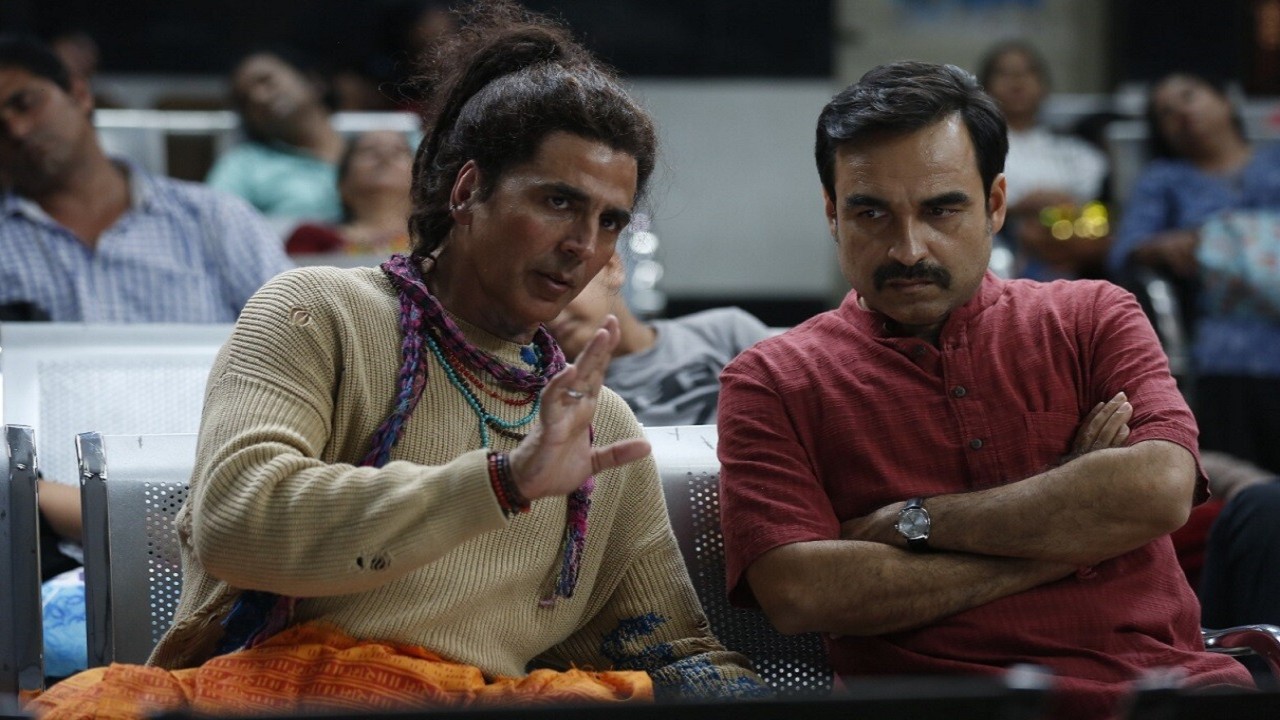Hindi Movie Review: OMG 2 falters in adapting the original scenario to a fit new social issue

The first Oh My God!, released in 2012, was a flawed film with an intriguing high concept, adapted from the Gujarati stage play Kanji Virudh Kanji and its inspiration, the Australian film The Man Who Sued God. The premise: With the earthquake that destroyed his shop deemed an “Act of God,” atheist Kanji Lalji Mehta seeks to take the responsible party – in this case, the Lord himself – to court. This evolves into a clever morality play that sees Kanji going after the self-anointed religious officers in society who collect donations only to enrich themselves, rather than serve the will of God and help others. While the setup of Oh My God! was better than its execution, which took the story into heavy-handed and obvious directions, it had a thought-provoking central idea relating to organized religion’s role in upholding justness. Looking back, it’s no surprise that such an ingenious, easily articulated concept that hit at the zeitgeist yielded big box office returns.
Oh My God! was clearly intended to be a self-contained story, so it’s hardly a surprise that its connection to this decade-later sequel feels awkward at best. The only common ingredient between the two films is Akshay Kumar, who reprises his role as a divine messenger – this time as a manifestation of Shiva, while last time it was Krishna. But even this part of the sequel feels like it has been shoehorned in. Whereas Kumar came across as a true spiritual guide to Kanji in the first film, offering divine counsel in urging him to read the Gita, Bible, and Quran for answers to his predicament, here he takes on more of the role of a “fairy godfather,” providing convenient solutions for protagonist Kanti Sharan Mudgal (Pankaj Tripathi) whenever he reaches a seemingly unsurmountable obstacle. As such, the franchise’s entire notion of spiritual devotion becomes muddled; whereas the first film ultimately extolled the virtues of unconditional belief in God, here it would seem the takeaway is you only need Him when you’re in a pinch. And this is only the beginning of the story’s thematic confusion.
In fact, OMG 2 is actually less about faith in God than it is about faith in public institutions. The cringey setup involves a young boy named Vivek (played by Aarush Varma), who is accused of an indecent act at school, stemming from a preposterous chain of events that I need not break down in painstaking detail here. Let’s just say that Vivek has been led to believe that the reason his dance class partner bailed on him is that “size does matter” and he’s attempting to take measures into his own hands.
With his son kicked out of school and feeling despondent over the incident, Vivek’s father, the aforementioned Kanti, conjures up a plan to sue the school and a lineup of snake oil (read: knockoff Viagra) salesmen who offered false promises to Vivek along the way. This is how OMG 2 reaches the same familiar courtroom scenario that its predecessor did. As with the original film, the court case becomes less about the monetary settlement than about proving a social point. Employing somewhat circuitous, questionable logic, Kanti makes the case that Vivek’s expulsion resulted chiefly from the school’s lack of comprehensive sex education; the movie itself then becomes a relevance-riddled plea for the same in Indian schools.
While one could certainly say that OMG 2 has noble intentions in advocating for access to sex education, the degree to which it must contort the events of its plot to fit both its social message and the same template as the first Oh My God!, so as to stay true to the franchise, verges on laughable. Kanti’s message to the court keeps changing throughout the case. First, it’s that Vivek was engaging in a perfectly natural act and should not be expelled for indecency (why his peers who decided to covertly film him in the process were spared disciplinary action is never explained). Next, Kanti suggests instead that if Vivek had simply been exposed to a proper sex education curriculum, the incident would have never happened, and it is therefore not the boy’s fault. Then, the father’s testimony expands to focus mostly on how Indian institutions’ regressive attitudes towards sexuality are actually an abandonment of the culture’s progressive origins (i.e., the Kama Sutra).
Kanti’s all-over-the-place argumentation isn’t a natural outgrowth of a character finding his voice, but rather, a result of the need to have Kumar’s Shiva messenger pop in and help out in the name of franchise fidelity. The filmmakers’ obligation to have Kumar drop another clue to assist Kanti’s success in the court case every half-hour or so yields downright schizophrenic storytelling. Kanti must constantly argue his way towards a dead-end only to be rescued with a fresh line of argumentation, gifted to him through divine intervention.
The film’s messaging itself becomes just as problematic and convoluted as its story direction. All that OMG 2 seems to coherently argue for is comprehensive sex education in schools – hardly an objectionable pursuit on its face. But the fact that it positions this as such a convenient answer to much larger societal problems introduced in the third act, including truly disturbing forms of sexual abuse that seem to be raised in the movie only to add to its perceived “social importance,” is highly questionable. Additionally, the fact that it equates the school administration with the religious figureheads from the first film by virtue of its copycat structure strikes me as a problematic equivalency. Much like Kanti himself, the movie can’t seem to make up its mind whether it’s advocating for a religious education or a secular one.
For as confused as the film seems to be, seemingly stemming from its attempt to function as a sequel out of financial opportunity rather than narrative necessity, it does have several positive assets. Chiefly, all of the performances are pretty good. Given the shortcomings of the writing of his character, Pankaj Tripathi manages to deliver a sympathetic and authentic portrait of a father seeking to do right by his son and his family. Yami Gautnam is magnetic as the hotshot attorney representing the school administration – as much as you loathe her tactics, you can’t quite dislike her character because she has such screen presence. Pavan Malhotra hams it up as the judge assigned to the case and he is responsible for a good portion of the film’s generally effective humor. Even as the more serious moments largely didn’t work for me, I had a good time with the better-constructed laughs; these made the movie watchable. And as Shiva’s messenger, fan-favorite Kumar strikes the right notes, though I didn’t find his work emotionally affecting in the same way that those responding more positively to the film overall have felt.
One can’t help but wonder what writer/director Amit Rai might have been able to do with this idea and this cast had he not been forced to hew so closely to the format of the original Oh My God!. Attempting to turn this subject into a courtroom play, in many ways, just does not make logical sense like the more metaphorical scenario of the first movie did. Hopefully, if there is an OMG 3 – which there likely will be, given the box office success of this one – the filmmakers find a way to devise a subject that is more conducive to the formula.

